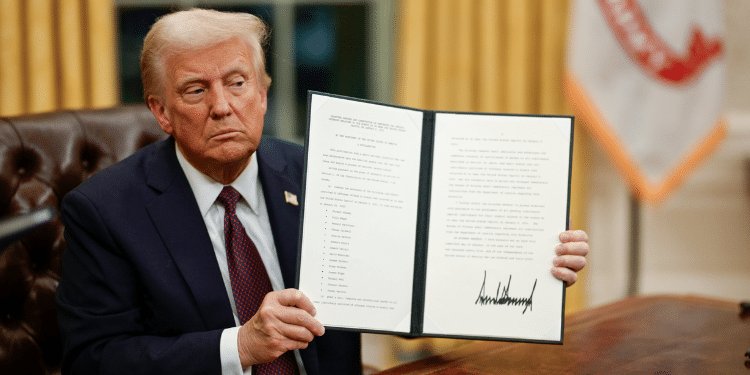In a dramatic escalation of trade tensions, former U.S. President Donald Trump has slapped a staggering 104% tariff on Chinese imports—igniting fears of a global trade war and triggering sharp market volatility across continents.
The move, confirmed on Tuesday, has sent shockwaves through global financial systems, with economists warning of serious repercussions for trade flows, market stability, and global economic recovery.
Global Markets React Swiftly
Asian markets bore the brunt of the initial hit. Japan’s Nikkei 225 plunged 3.6%, Hong Kong’s Hang Seng Index dropped 1.6%, while Taiwan’s benchmark slid a worrying 4.6%. U.S. markets were also severely impacted, with the S&P 500 shedding nearly $6 trillion in value over four consecutive trading days.
European exchanges weren’t spared either. Germany’s DAX, France’s CAC 40, and London’s FTSE 100 all registered significant losses, underlining the global scale of the fallout.
Currency and Commodities Hit
In currency markets, the U.S. dollar weakened against safe-haven currencies like the yen and Swiss franc, while China’s yuan slipped to its lowest level since 2007.
Commodity prices also reflected the growing uncertainty. Oil prices dropped by 4%, largely due to expectations of reduced Chinese demand. Meanwhile, gold rose by 0.7% as investors sought refuge in traditional safe-haven assets.
China Responds with Countermeasures
China was quick to retaliate, imposing a 34% tariff on U.S. goods while also allowing its currency to weaken further—a calculated move to buffer its export sector. Economists fear that continued escalation between the world’s two largest economies could spiral into a full-scale trade war, potentially plunging the global economy into recession.
Trump Defends Tariff Policy
Despite mounting criticism, Trump doubled down, claiming the tariffs would generate over $2 billion daily in revenue and give the U.S. stronger leverage in trade negotiations. However, critics—including members of his own Republican Party—are now pushing back, seeking to curtail the president’s tariff authority over concerns of long-term economic damage.
Global Trade in Crosshairs
Countries like Germany, Vietnam, Japan, and South Korea are already reassessing their trade strategies, with some pushing for diplomatic negotiations to avoid further destabilization.
As the world watches the unfolding situation, experts warn that the consequences could extend far beyond tariffs—affecting supply chains, inflation, employment, and overall market confidence.
Stay with KeleleHub.co.ke for real-time updates on global trade and economic news.
Follow us on @kelelehubnews | Telegram | Facebook | WhatsApp for live alerts.


